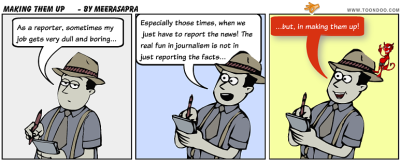ms302313@ohio.edu
Can we trust anything we read anymore? It can be hard to tell these days with the changes in all forms of journalism and messages to the public.
With the emergence of online news websites that aren't necessarily traditional in the sense of the word, accuracy and truth have become somewhat blurred. News has become so instantaneous online, that it is hard to know what is actually verified information and what is not.
Journalists have always followed the Code of Ethics when it comes to honesty and accuracy when putting out content. That is a thing of the past for some publications. For those select few, it isn't about truth and accuracy anymore but, rather speed.
Everyone wants to be the first to get the story out there. That means doing less fact checking and investigating. Basically, they just throw the story out there. As consumers of the media, we have to decide if we care that the information is completely true the first time it's published. Or, do we just check other sources to see what they've written?
Inaccuracy from speed and just a general lack of caring on a journalist's part can threaten the credibility of the journalist and the publication itself. The result of this is the publications losing readers because of a lack of trust. Just as us readers have to decide if we care about the inaccuracy, the publications have to decide if they care about losing them.
BuzzFeed
The online website, BuzzFeed has gone against the traditional forms of journalism by just posting content before verifying whether it is real or true. This is mainly because it is trying to get the information out their quickly and before others.
This has gone against what journalists have always done, which is to always verify the information and make sure what you are putting out is the complete truth. In a lot of ways, it is easier to not fact check, and get the information out there before any of your competition. But, that isn't always taken well.
KFC Backlash
An example of a company that has gotten some backlash for their dishonesty is KFC. While not a news company, their dishonesty is in their advertising. Any logical person knows that KFC is not good for you. It is fast food, after all. But, they still tried to make their food seem like it wasn't as bad for you, which is not only dishonest, but pointless. And for the people who, for whatever reason, aren't aware that KFC is bad for you, it is blatantly lying to a customer in order for them to buy your product. This can backfire later on when those same customers find out that they were being misled and no longer go there for food.
 |
| https://aaroncronin.wordpress.com/2014/09/23/speed-v-accuracy-in-online-journalism/ |
Will news publications continue to be able to get away with dishonesty? Only time will tell. Until then, us readers must always be conscious and remember to check other sources before we completely believe.
No comments:
Post a Comment